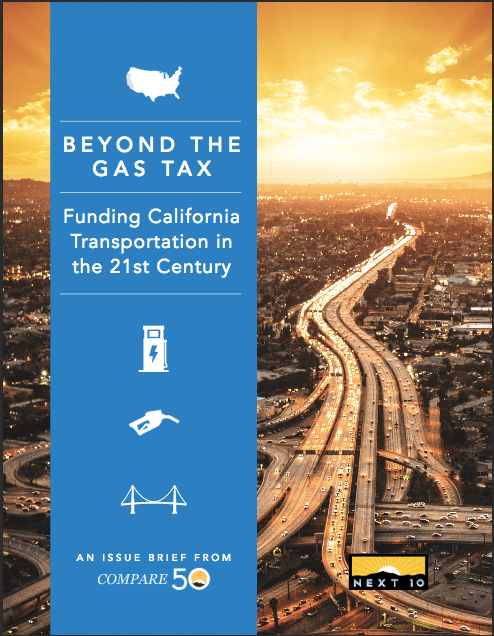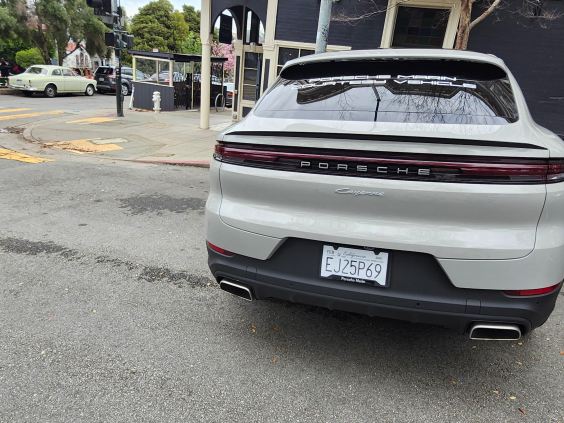A new report from Next 10 got a lot of press last week. Its basic premise bears repeating: raising the gas tax is not a long-term solution for funding California transportation.
S.B. 1, which the governor signed on Friday, is a significant and historic achievement, one that until a few years ago many believed was impossible. The measure will raise $52 billion in much-needed revenue for roads and transit over the next ten years, largely by raising gas taxes and vehicle registration fees.
One of the strengths of a gas tax is that it replicates a user fee: the amount of tax paid is related to how much a person drives. But if California is successful at increasing the proportion of zero-emission and highly fuel-efficient vehicles on California roads, car drivers will pay less and less fuel tax per mile driven.
Fewer gas guzzling smog machines on California roads is a good thing. Not so good is that dwindling revenue over time.
Noel Perry, Founder of Next 10, says that S.B. 1 is a “very, very good start to begin to fix our roads,” but that ultimately “the way in which we fund roads with gas taxes is not sustainable over the long run.”
The new law “is the beginning of the conversation,” added Adam Fowler of Beacon Economics, one of the authors of the report. “Right now we don't have a real alternative to the fuel tax, which is already in place and is relatively low cost to administer.”
Next 10 is a “nonpartisan, nonprofit think tank” whose goal is to “educate, engage, and inform Californians about issues at the intersection of the economy, environment, and climate change.” Its focus, as can be deduced from its name, is on the next ten years, and on what shifts in thinking will need to happen to keep California moving forward.
Next 10 commissioned this report, Beyond the Gas Tax: Funding California Transportation in the 21st Century, in response to the issues that gave rise to S.B. 1: the poor state of California's roads, the rising costs of fixing those roads, and decreasing revenue due to a wide variety of factors. Those include state policies such as not raising the gas tax for many years, encouraging more efficient and cleaner cars, and spending money on new roads while neglecting to maintain existing infrastructure.
“Fuel tax revenue is going down,” said Fowler. “Inflation-adjusted fuel tax revenue declined twenty percent in just the last five years.”
Some Republicans even cited future declines in gas tax revenue as a reason for opposing S.B. 1—but that is not exactly a solution to the problem.
“Maybe there's room for some bipartisan agreement,” said Fowler. “Both sides of the aisle need to see that this is an outdated method of paying for roads, and a new model needs to be worked on.”
He pointed out that, as time passes, those people who drive bigger vehicles and farther distances will end up bearing more of the burden of gas taxes than others. “The gas tax is a very regressive tax,” he said.
This is a debatable point. General taxes paid equally by everyone, like sales taxes, are clearly regressive--and sales taxes are used more and more frequently to fund local transportation projects. Gas taxes do adversely impact the driving poor, but millions of the lowest income Californians are too poor to own a car, and hence are not directly affected adversely by a gas tax.
The Next 10 report offers a few suggestions for replacing the tax as a revenue source, but each of them has its own trade-offs to consider. They are: implement some kind of mileage-based user fees; charge tolls, as a clear price signal for drivers about their true costs; and employ congestion pricing in urban areas.
California just wrapped up a pilot program to test the concept of mileage-based user fees, and the California Transportation Commission is expected to issue a report soon on its findings. However, although that conversation has begun, the idea is still a long way from being adopted; many trade-offs and challenges, including privacy concerns, remain to be settled.
Fowler points out that congestion pricing plans, though controversial, can provide useful incentives to encourage more thoughtful travel behavior. “Part of me likes that [idea] a lot,” he said. “You can nudge people towards better choices. And it doesn't have to be a big money maker,” he added. Pricing just needs to make it clear to people what costs their decisions impose on everyone.
“I myself make errands at rush hour,” he said, “but if I had an incentive not to, it would make me think twice before adding another car to the mix.”
Ultimately what is needed is a new source of revenue, and the more closely it is tied to usage of the transportation system, the better off California will be.
“Surface transportation is so key to the economy,” said Fowler. “Goods movement is crucial—that's why we built the interstate highway system. Movement of people and services is key, and nothing functions without it.”
But it costs money, and people want their own transportation to be as cheap for them as possible. If taxing fuel is not going to work in the long run, “something has to come in and replace that revenue,” he said.
“There is no silver bullet. It's a constant balancing act.”






